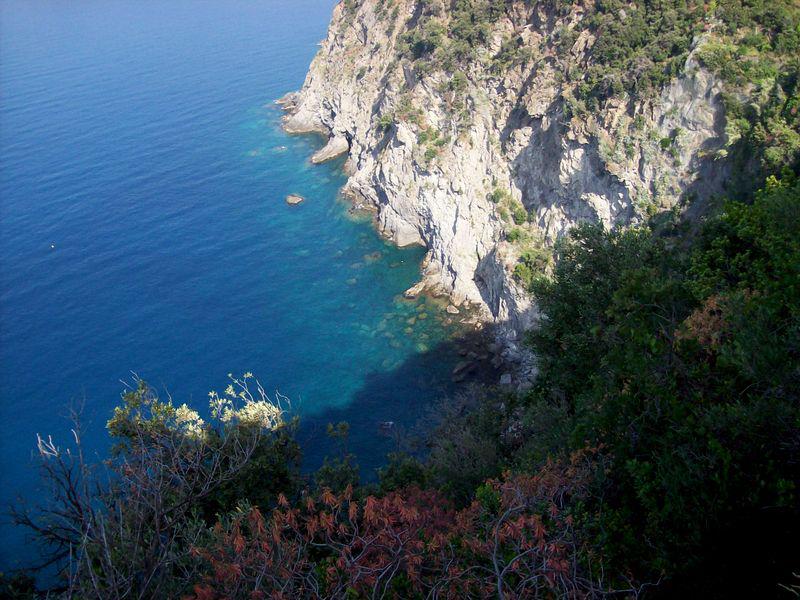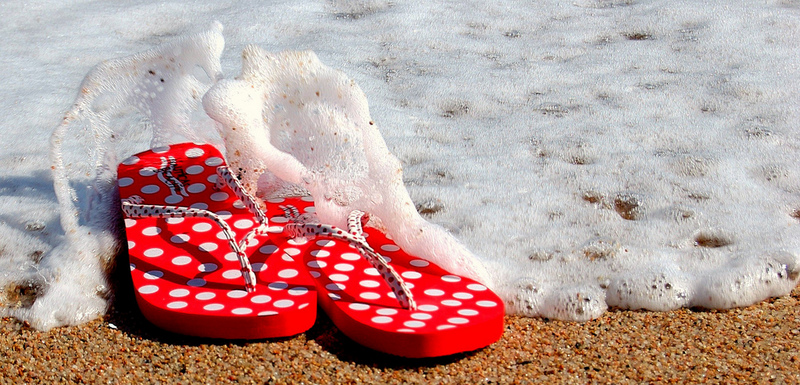If you’ve studied Italian in language classes or from books, it can be an unsettling surprise to arrive in Italy and find that colloquial Italian is peppered with words and expressions that no one ever told you about.

Ecco laggiù il mare! Photo © Geoff Chamberlain
One such word is ecco. You hear it all the time, but it’s difficult to pin down exactly what it means. Ecco is used in many different contexts, and finding an exact equivalent in English seems hopeless.
As usual in these cases, the best remedy is to study practical examples of its usage. Ecco, that’s exactly what we’re going to do today. Ecco qualche esempio (Here are some examples):
Ecco is very often used when beginning an explanation, or working out what to say, and in this case it means something like “well …”:
“Che lavoro fai?” (“what work do you do?”) … “Ecco, io lavoro come bagnino sulla spiaggia” (“well, I work as a lifeguard on the beach”)
You’ll also hear it used in everyday conversation as an exclamation of agreement meaning “that’s right!”
In this case, it’s often followed by appunto or esatto (exactly):
“guarda quanta gente sta arrivando alla spiaggia, meno male che siamo arrivati presto!” (Look how many people are coming onto the beach, thank goodness we arrived early!”) … “Ecco, appunto!” (“That’s right, exactly!”)
Sometimes ecco is used as an exclamation meaning ‘here’ or ‘there’, at the moment of arrival.
In this instance, ecco is combined with the direct personal pronoun mi, ti, lo, la, ci, vi, li, le e.g. ecco (here/there) + vi (you [plural]) becomes eccovi (here/there you are). Obviously the choice of ‘here’ or ‘there’ depends on the situation:
“Eccoci arrivati al mare” (“here we are, we’re at the sea”), “eccovi finalmente!” (“here/there you are, finally!”), “Serena, dove sei … vieni in acqua?” (“Serena, where are you, are you coming into the water?”) … “eccomi, arrivo!” (“Here I am, I’m coming!“).
It can also mean ‘here is/are’ or ‘there is/are’:

“ecco le infradito per la spiaggia” Photo CC by Bermi Ferrer
“Ecco laggiù il mare” (“there’s the sea down there”), “ecco il tuo costume da bagno” (“here’s your swim suit”), “ecco le infradito per la spiaggia” (“here are your flip flops for the beach”).
and ‘this is’ or ‘that is’:
“Ecco come fare un bel castello di sabbia!” (“that’s how you make a nice sand castle!”).
When used with perché, ecco means ‘that’s why’:
“Sono stato in vacanza al mare per tre settimane” (“I’ve been on holiday at the sea for three weeks”) …”ecco perché non ti ho visto in giro!” (“that’s why I haven’t seen you around!”).
A couple of useful colloquial expression …
At the end of a summary or explanation we sometimes say “ecco tutto” (“that’s all”).
To say that something is done, or finished we often use “ecco fatto” (“that’s that” or “it’s done”)
… and finally …
… eccoci alla fine del blog! (here we are at the end of the blog!).
A presto …


Comments:
Dr. Jose Torres:
Quite interesting! I have been puzzled by the exact meaning of “ecco” and your article sheds a light on it.
Thank you.
Colin Rees:
A really informative post, full of expressions I am likely to hear or use. I felt I really learnt something useful in a short space of time. Thank you.
Bill Auge:
Ho pensato che sapevo come utilizzare la parola ecco, ma uno nuovo scoperto quanto poco io so.
Hazel Spiers:
Mi e’ piaciuto molto il blog!
Carolina:
This was a great post thanks! There is a word that it is used in Ecuador, école, meaning many things like sure, right, I agree, there…I imagine its origin is Italian..
Ecco che gioa grazie tante!